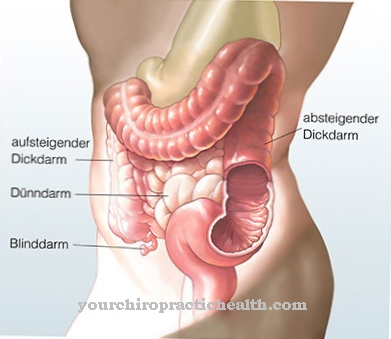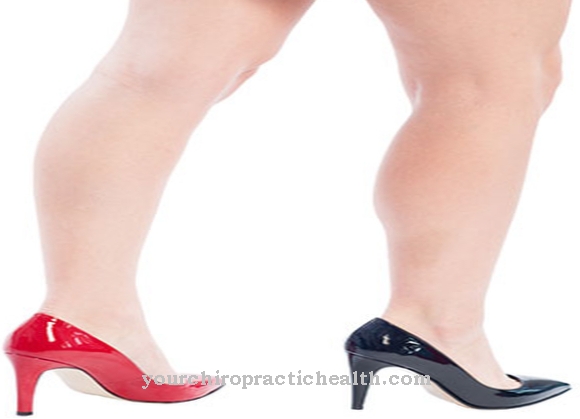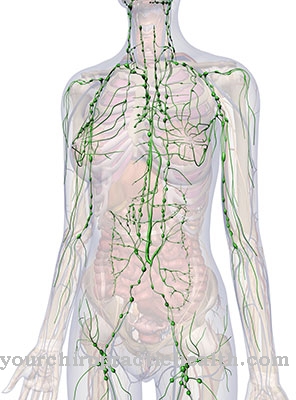The Schmidt syndrome is also as autoimmune polyendocrine syndrome type II known. It is an autoimmune disease that is associated with several hormone gland insufficiencies.
What is Schmidt Syndrome?

© Double Brain - stock.adobe.com
The Schmidt syndrome was originally described by the pathologist Martin Benno Schmidt as a combination of Addison's disease and Hashimoto's thyroiditis. Hashimoto's thyroiditis is a chronic inflammation of the thyroid gland that leads to an underactive thyroid. Addison's disease is an underactive adrenal cortex.
Over the years, the definition of Schmidt syndrome has been expanded to include other autoimmune diseases. These can also be present, but do not have to be. The facultative autoimmune diseases of Schmidt syndrome include alopecia, pernicious anemia, myasthenia gravis and type 1 diabetes mellitus.
causes
As with many other autoimmune diseases, the causes of Schmidt syndrome are unknown. However, genetic predisposition seems to play a role. It has been observed that HLA class II types DR4 and DR3 occur more frequently in patients with Schmidt syndrome than in healthy people. HLA stands for Human Leukocyte Antigen.
These are glycoproteins that are anchored in the membrane of cells. They give the cell an individual signature and play an important role in the immune system. They help the immune system to differentiate between the body's own and non-body structures. Adult women are most often affected by Schmidt syndrome.
Symptoms, ailments & signs
The first symptoms typically only appear in adulthood. The symptoms of Schmidt syndrome result from the insufficiency of the various hormonal glands. Damage to the adrenal cortex results in Addison's disease. The lack of the hormone aldosterone leads to low blood pressure, hyponatremia and hyperkalemia.
The lack of cortisol causes weakness, nausea and vomiting. Patients have low blood sugar and lose weight. Due to the lack of cortisol, the pituitary gland produces more ACTH. This causes a release of melatonin and thus hyperpigmentation of the skin. The patients stand out for their bronze complexion.
Hashimoto's thyroiditis is often associated with an underactive thyroid (hypothyroidism). Typical symptoms of hypothyroidism are cold intolerance, pasty edema, hair loss, constipation, weight gain and loss of libido. At the onset of Hashimoto's thyroiditis, patients can also develop an overactive thyroid, known as Hashitoxicosis.
When the body's own immune cells turn against the beta cells in the pancreas, type 1 diabetes develops. The beta cells produce the hormone insulin, so the damage leads to insulin deficiency. Without insulin, the cells of the body cannot absorb glucose from the blood. The result is hyperglycaemia.
Due to the destruction of the melanocytes in the skin, white spot disease can develop. Typical of the disease, which is also called Vitiligo, is a patchy loss of pigment. Pernicious anemia can also develop. Pernicious anemia is caused by a lack of vitamin B12.
The cause of the deficiency is a chronic inflammation of the gastric mucosa, which is caused by the antibodies in Schmidt syndrome. The inflammation causes the cells in the stomach to not make enough intrinsic factor. This is necessary for the absorption of vitamin B12 in the intestine. Characteristic of pernicious anemia are symptoms such as a burning sensation in the tongue, red coloring of the tongue, neurological complaints, tiredness, paleness and difficulty concentrating. An increased susceptibility to infections can also occur.
Diagnosis & course of disease
If Schmidt syndrome is suspected, an antibody test is carried out in the blood. In addition, the individual hormonal glands are diagnosed. For this purpose, the hormones T3, T4, TSH, cortisone, aldosterone, insulin, glucagon and melatonin are determined in the blood. Depending on the severity, there is a deficiency in some hormones.
The HLA class types D3 and D4 can possibly be verified. To assess the extent of the disease and to diagnose the individual hormone insufficiencies, imaging procedures such as ultrasound or CT can also be performed.
Complications
Schmidt syndrome can lead to a number of different symptoms. In most cases, those affected suffer from decreased blood pressure and continue to suffer from anemia. This can lead to dizziness and, in many cases, loss of consciousness. If the patient faints, they may also be injured.
In addition, those affected often feel tired and exhausted, although the tiredness cannot be compensated with the help of sleep. A malfunction of the thyroid gland also occurs and has a very negative effect on the quality of life of the person concerned. Most patients also have a lack of insulin and need special treatment. The lack of vitamin B12 can also lead to skin problems.
At a young age, patients suffer from concentration disorders and an increased susceptibility to infections. The stomach lining can also become inflamed. Schmidt syndrome is usually treated with the help of medication. The person concerned usually has to take this for his entire life. There are no particular complications. However, it cannot generally be predicted whether the syndrome will lead to a reduced life expectancy.
When should you go to the doctor?
With Schmidt syndrome, a visit to a doctor is always necessary. Self-healing cannot occur, so medical treatment is essential. Since it is a hereditary disease, it cannot be treated causally but only symptomatically. A doctor should be consulted if the person concerned has very low blood pressure. It is not uncommon for this to lead to hyperpigmentation of the skin. Nausea or a feeling of weakness are also indicators of Schmidt syndrome.
If these complaints occur without a particular reason, a doctor should be consulted. Furthermore, an overactive thyroid can also indicate Schmidt syndrome and should be examined by a doctor. In some cases, permanent inflammation of the gastric mucosa also suggests Schmidt syndrome and should also be examined and treated by a doctor.
First and foremost, a general practitioner can be visited. The further treatment of Schmidt syndrome is then carried out by the respective specialist and depends very much on the exact type and severity of the symptoms.
Therapy & Treatment
In Schmidt syndrome, the individual diseases present are treated. Addison's disease is treated with lifelong substitution of glucocorticoids and mineral corticoids. The substitution of cortisol should be carried out according to the circadian rhythm. The dose of cortisol is higher in the morning than in the evening. In the event of physical stress, the dose must be adjusted accordingly.
The hormone aldosterone is replaced by the cortisol derivative fludrocortisone. It has the same mineral corticoid effect as aldosterone. The therapy of Hashimoto's thyroiditis aims to normalize the thyroid hormone level in the blood. For this, the patients receive L-thyroxine. In some cases, taking selenium can help lower the antibodies and thereby reduce inflammation.
If the patient also has a conversion disorder from T4 to T3, a combination of L-thyroxine and liothyronine is used. In pernicious anemia, vitamin B12 must be substituted directly. Since absorption in the intestine is no longer guaranteed, the vitamin cannot be administered orally. An injection is required. Alternatively, the missing intrinsic factor can also be administered. In this way, the cobalamin can be reabsorbed in the intestine.
If patients have myasthenia gravis, immunosuppressive therapy is chosen. In addition, those affected receive glucocorticoids and cytostatics. If the symptoms are severe, plasmapheresis may be required to purify the blood. Acetylcholinesterase inhibitors such as pyridostigmine provide symptomatic relief.
The white spot disease is treated conservatively with cortisone ointments, photochemotherapy, cosmetics and UV protection. Depending on the condition of the skin, the remaining skin can be bleached with hydroquinone monobenzyl ether. Alternatively, repigmentation with narrowband UVB light is also possible.
prevention
Since the cause of Schmidt syndrome is unknown, there are currently no effective preventive measures.
Aftercare
Schmidt syndrome is treated symptomatically. There is usually no follow-up care because the disease is chronic and cannot be cured. In the course of the disease, further symptoms may arise that need to be clarified. Follow-up care is carried out by the specialist in internal medicine.
As part of the aftercare, a personal conversation is held with the patient, followed by a physical examination. If hormonal symptoms persist, blood can also be drawn to determine the cause. The purpose of the discussion with the patient is to narrow down the symptoms and determine further drug treatment.
If the patient has kept a complaint diary in the course of the illness or otherwise noted the symptoms, appropriate documents should be presented to the doctor. They facilitate further planning regarding the therapy of the autoimmune disease. Regular visits to the doctor are still required after follow-up care.
Schmidt syndrome can cause other symptoms such as circulatory disorders or dizziness, which can cause serious health complications. Therefore, close medical monitoring is necessary even after the follow-up. It is best to discuss the exact measures to be taken in Schmidt syndrome with the responsible doctor. If necessary, the doctor can involve other specialists in follow-up care.
You can do that yourself
In Schmidt syndrome, there is low blood pressure. Because of this, people with this disorder can take some steps to help improve blood pressure and circulation.
Immediately after getting up, the first exercises and training can be carried out, which increase the blood pressure as you wake up. Rush and stress are to be avoided as a matter of principle. The hands and feet can receive impulses from grasping movements that stimulate the brood cycle. The consumption of products containing caffeine can also help to alleviate existing symptoms. A balanced and healthy diet will help those affected to reduce symptoms such as constipation or unwanted weight gain to a minimum. Sufficient exercise is also advisable to stimulate digestion and stabilize the immune system. A vitamin-rich food supply and the avoidance of harmful substances such as nicotine or alcohol also promote well-being and reduce possible complaints.
Cognitive training and optimization of learning behavior can be helpful in the case of disturbances in concentration. A mental overload should be avoided in the fulfillment of daily tasks. Learning content or the structuring of any obligations must be tailored to the possibilities of the person concerned. Since the disease can lead to increased fatigue, the rest phases and breaks must also be optimized. Sleep hygiene should be controlled and improved.



-durch-vitamin-b12-mangel.jpg)
.jpg)







.jpg)



.jpg)










.jpg)
